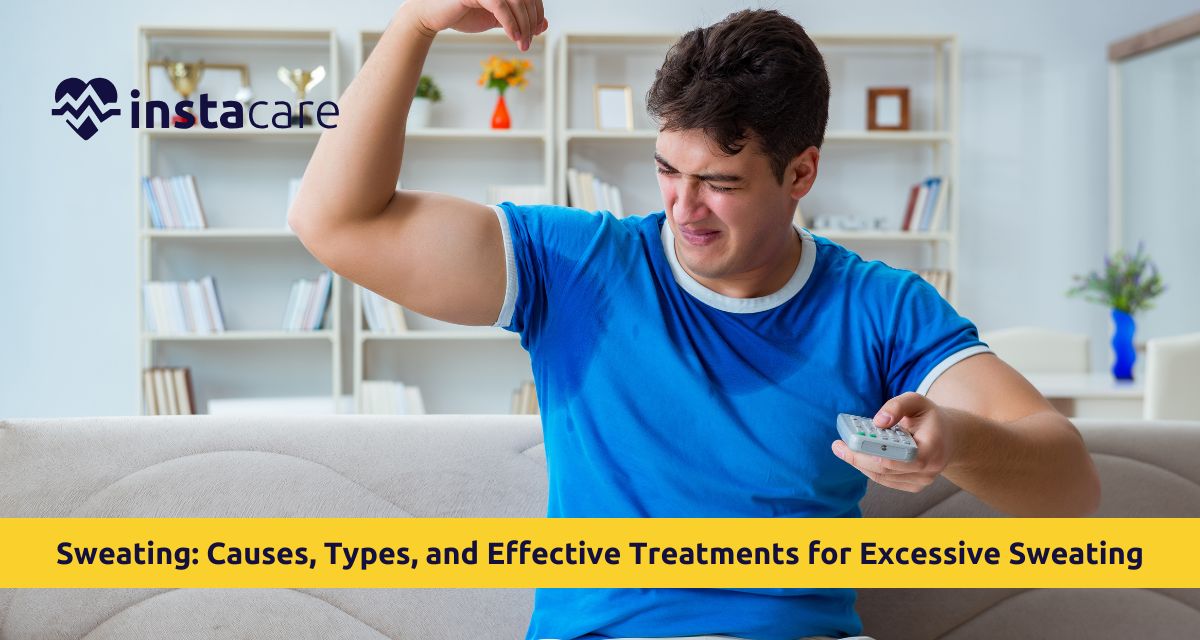What Is Sweating?
Sweating or perspiration is a process through which the body becomes cooled. Sweating occurs due to the release of salty, watery fluid (sweat) from sweat glands through pores onto the surface of the skin. Sweat cools your body temperature inside by evaporation. The process is autonomic and serves an essential role in thermoregulation.
But not all that sweats is good. Sweating excessively in unusual situations, like cold-climate excessive sweating, nighttime neurogenic sweating, can be a sign of disease.
Types of Sweating
Understanding the various types of sweating is the key to understanding whether your sweating is normal or not.
Normal Sweating
By virtue of exercise, heat setting, or emotional reaction like fear or excitement.
Excessive Sweating (Hyperhidrosis)
Excessive sweating (hyperhidrosis) is a condition where you will have abnormal sweating more than your body requires, despite not being for cooling. It occurs in approximately 2-3% of the population.
- Primary Hyperhidrosis: Involves specific areas of the body like underarm, palms, soles, or face. This occurs to you during puberty and lacks an etiological foundation in medicine.
- Secondary Hyperhidrosis: Because of secondary medical illness such as diabetes, thyroid, or infection. It is over-sweating all over the body.
Cold Sweats
Cold sweats, on the other hand, are generated because of fear, tension, or medical emergencies, i.e., low blood pressure, heart attack, or shock.
Night Sweats
Night sweating, wetting of bed and clothes, is because of infections, endocrine disease, or medication.
Stress and Emotional Sweating
Stress and sweating occur most commonly due to tension or fear, these sweats happen most frequently in armpits, palm of the hand, and feet.
Causes of Excessive Sweating
There are various causes that lead to or cause excessive sweating. Awareness of the cause is necessary in order to successfully undergo therapy.
Diseases that cause sweating:
- Hyperthyroidism: The metabolic rate is increased by hyperactivity of the thyroid gland causing the body to have excessive sweat.
- Diabetes: Hypoglycemia (diabetes) causes sweating or excessive sweating at night
- Diseases: Endocarditis or tuberculosis can cause the symptom.
- Menopause: There can also be hot flashes or perspiration.
- Some cancers: Lymphoma results in night sweats.
- Obesity: Central temperature is elevated in obesity, and therefore sweating.
2. Problems of lifestyle
- Spicy food and alcohol can lead to mealtime sweating.
- Cigarettes and caffeine can result in nervous system overstimulation.
- Poor ventilation of air or tight clothing can trap heat and lead to excessive sweating.
3. Medications
Some painkillers, diabetics, and antidepressants have excessive sweating as a side effect.
4. Sweating and Anxiety
Emotional sweating and anxiety, social contact, or panic attacks usually result in sweating without exercise, most commonly on palms and underarms.
Diagnosis of Excessive Sweating
If you are having uncontrollable or spontaneous sweating, what you need is diagnosis. Here's how it's most commonly done:
Physical Examination and Medical History
Your doctor will ask you about precipitants, severity, and duration of sweats' attacks. Your doctor can examine you for the underlying medical conditions causing sweating.
Laboratory Tests
Blood examination, urine examination, or thyroid function tests exclude endocrine or systemic cause of inappropriate excessive sweating.
Starch-Iodine Test
It identifies areas on your body where you over-sweat by applying starch and iodine solution on your body and the areas which stain dark after becoming wet.
Thermoregulatory Sweat Test
It examines your own body's pattern of sweating under controlled conditions in order to assess whether you have primary or secondary hyperhidrosis. Treatment is greatest if found early enough to receive the best treatments for excessive sweating.
Best Treatment Options
It is a kind of frustration to be an excessive sweating, but there are a lot of treatments to adapt and cope up with this type ranging from lifestyle changes, to some medication.
Topical Antiperspirants
Over-the-counter or prescribed aluminum chloride solutions can close up sweat glands.
- Best for: Over-the-counter or prescription creams applied to treat armpits, outstretched hands, and feet
- Tips: Take at night to permit complete absorption
Oral Medications
Anticholinergic medications like glycopyrrolate turn off nerve impulses to slow sweating. Side effects are dry mouth, blurry vision, or others.
- Best for: Overall sweating or when other treatment does not work
Botox Injections
Botox injections temporarily block the sweat glands.
- FDA-approved for underarm sweating solutions
- Effect lasts 4 to 6 months
- Minimally invasive with quick recovery
Iontophoresis
Non-surgical procedure where a mild electric current is used through the skin and water to eliminate overactive sweat glands.
- Best for: Palmar (hand) and plantar (foot) hyperhidrosis
- Needs to be treated several times weekly initially
Microwave Therapy (miraDry)
Eliminates underarm sweat and odor glands using microwave heat.
- Permanent outcome for underarm sweating
- Low downtime
Surgery
Only for longstanding cases that cannot be managed with other treatments.
- Endoscopic thoracic sympathectomy (ETS): Trims nerves that regulate sweating
- Compensatory sweating (sweating elsewhere on the body)
Lifestyle modifications
- Wear loose, wicking clothing
- Avoid spicy food, caffeine, and booze
- Talk stress down through meditation or mindfulness
- Sweat diary to track triggers
Conclusion
Sweating is a normal and healthy bodily process, but embarrassing, recurring, or copious sweating will destroy your life. Whether you experience postprandial sweating, nocturnal sweats, or nonspecific sweats, hope exists. Good care begins with determining what type and origin of sweating you have and getting diagnosed.
From clinical treatments such as Botox and miraDry to the simplest underarm sweat solution and lifestyle modifications, you now have something to be proud of: your arsenal. If you're sweating and hot or just have a good reason to suspect otherwise, don't wait, visit a health care provider today. Don't be quiet and guess; answers are yours for the asking.
Please book an appointment with the best
General Physician in Lahore, Karachi, Islamabad, and all major cities of Pakistan through
InstaCare, or call our helpline at 03171777509 to find a verified doctor for your disease.

